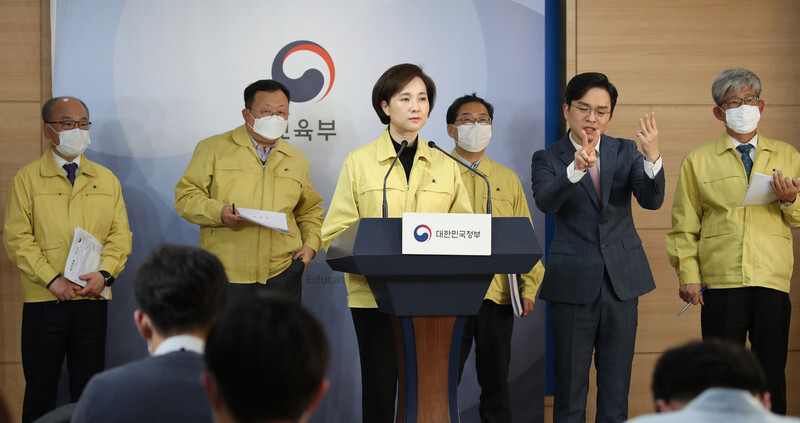hankyoreh
Links to other country sites 다른 나라 사이트 링크
S. Korean schools to delay spring semester for another 2 weeks

With the outbreak of the novel coronavirus in South Korea showing no signs of subsiding, the government has decided to postpone the spring semester at kindergartens and primary and secondary schools around the country for two more weeks. This unprecedented three-week closure of schools is likely to leave parents scrambling to care for their children for even longer.
“Because the next few weeks are crucial for stopping the spread of the coronavirus around the country, we’ve decided to delay the spring semester for all kindergartens and primary and secondary schools by two more weeks, from the original date of Mar. 9 to Mar. 23,” Education Minister Yoo Eun-hae said in a press briefing at the Central Government Complex in Seoul on Mar. 2. Yoo, who also serves as the deputy prime minister, added that universities “should be holding classes remotely, allowing students to stay at home instead of having them assemble at school, until the coronavirus situation has been stabilized.”
The Ministry of Education (MOE) explained that these measures were based on the advice of experts and public health authorities, who are calling for schools to minimize movement and contact with the outside to preemptively stop the transmission of the disease in families and communities. The growing number of minors who are contracting COVID-19, the disease caused by the novel coronavirus, also affected the decision.
The postponement means that schools are now taking 15 days off, which is likely to lead to a corresponding decrease in summer vacation days. But if the COVID-19 outbreak doesn’t slow down and the semester is postponed once again, it will cut into the legally required number of school days, presenting a real problem for the academic calendar. An MOE spokesperson said that if a prolongation of the outbreak causes the semester to be pushed back later than Mar. 23, measures will be tailored according to the situation in each region.
“Even during the semester delay, we will be providing information about homeroom assignments and curriculum plans and helping students prepare for the new semester from home by providing digital textbooks and EBS [Educational Broadcasting System] videos free of charge,” the MOE said in connection with the additional delay of the semester. As for the continuing gap in child care, the MOE intends to accept more applications for the emergency childcare services provided at kindergartens and elementary schools. After few people applied for emergency childcare, the government announced it was extending the period of care until 5 pm and providing up to 500,000 won (US$419.27) in aid for workers who take unpaid leave to look after children aged eight years old or younger.
On Monday, the MOE also urged private academies to go on vacation; recognizing that this will put smaller academies in a bind, the MOE will consider making such academies eligible for the financial assistance allocated for dealing with the COVID-19 outbreak. This recommendation seeks to prevent children from clustering at academies instead of public schools, which would undermine the effectiveness of the MOE’s decision to delay the spring semester.
After recommending that universities delay the start of classes for another two weeks, the MOE said it intended to reduce the risk of COVID-19 transmission by having universities hold classes remotely. The MOE is planning to authorize universities to develop and distribute their own classes and materials for distance learning and to set up a distance education management advisory committee to assist universities toward that end.
Yoo said that these measures would be in place “during March, for about one month, until the COVID-19 situation is stabilized.” The MOE said on Monday that only 3,818 Chinese students had entered the country between Feb. 24 and Feb. 29, about half of the expected figure of 8,234.
By Choi Won-hyung, staff reporter
Please direct comments or questions to [english@hani.co.kr]

Editorial・opinion
![[Editorial] Intensifying US-China rivalry means Seoul must address uncertainty with Beijing sooner than later [Editorial] Intensifying US-China rivalry means Seoul must address uncertainty with Beijing sooner than later](https://flexible.img.hani.co.kr/flexible/normal/500/300/imgdb/original/2024/0517/8117159322045222.jpg) [Editorial] Intensifying US-China rivalry means Seoul must address uncertainty with Beijing sooner than later
[Editorial] Intensifying US-China rivalry means Seoul must address uncertainty with Beijing sooner than later![[Column] When ‘fairness’ means hate and violence [Column] When ‘fairness’ means hate and violence](https://flexible.img.hani.co.kr/flexible/normal/500/300/imgdb/original/2024/0516/7417158465908824.jpg) [Column] When ‘fairness’ means hate and violence
[Column] When ‘fairness’ means hate and violence- [Editorial] Yoon must stop abusing authority to shield himself from investigation
- [Column] US troop withdrawal from Korea could be the Acheson Line all over
- [Column] How to win back readers who’ve turned to YouTube for news
- [Column] Welcome to the president’s pity party
- [Editorial] Korea must respond firmly to Japan’s attempt to usurp Line
- [Editorial] Transfers of prosecutors investigating Korea’s first lady send chilling message
- [Column] Will Seoul’s ties with Moscow really recover on their own?
- [Column] Samsung’s ‘lost decade’ and Lee Jae-yong’s mismatched chopsticks
Most viewed articles
- 1[Editorial] Transfers of prosecutors investigating Korea’s first lady send chilling message
- 2S. Korea “monitoring developments” after report of secret Chinese police station in Seoul
- 3[Exclusive] Unearthed memo suggests Gwangju Uprising missing may have been cremated
- 4[Editorial] Intensifying US-China rivalry means Seoul must address uncertainty with Beijing sooner t
- 5China, Russia put foot down on US moves in Asia, ratchet up solidarity with N. Korea
- 6Xi, Putin ‘oppose acts of military intimidation’ against N. Korea by US in joint statement
- 7Truth commission confirms Korean War killings by soldiers and police
- 8[Editorial] South Korean women are mobilizing in unprecedented ways
- 9Calls for gender-equality continue as demonstrations target President Moon
- 10[Column] “Hoesik” as ritual of hierarchical obedience